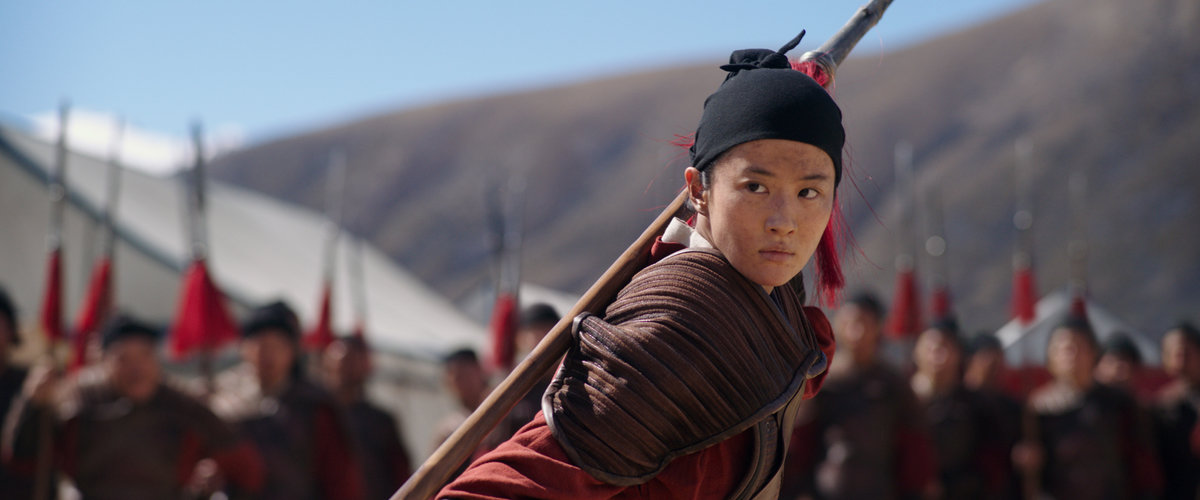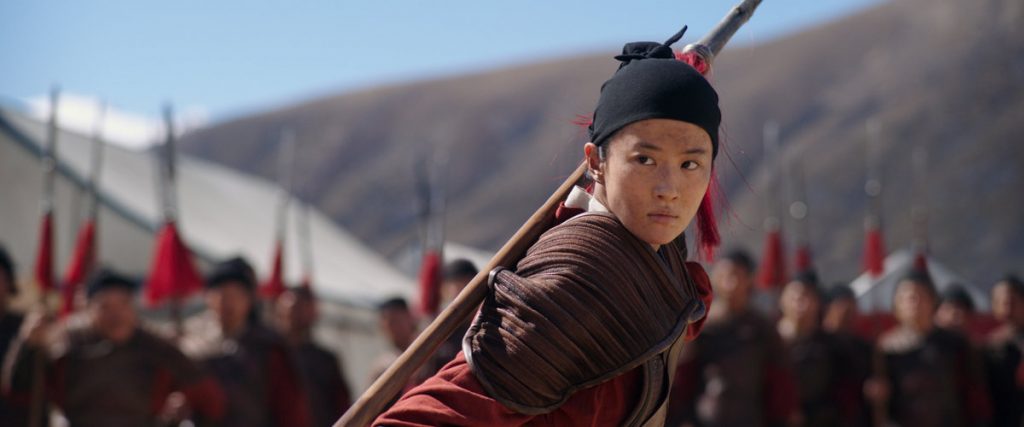

Like a plate of microwaved leftovers, Mulan is the latest live-action reheat of a Disney animated favorite. Visually gorgeous yet otherwise rather underwhelming, the most remarkable quality of this rendition is its zeitgeisty revisionism: specifically, if the original telling were not already a coming out story, it is pretty unmistakably one now.
Currently streamable with a regular Disney+ subscription, this iteration of the story arrives on the scene a little more than twenty years after Disney’s first representation of the fabled Chinese woman-turned-warrior.
While the overall story arc remains the same, there are several significant changes.
In addition to the rating jump from G to PG-13, this latest effort clearly takes pains to be more historically accurate and culturally sensitive. The result is a more serious, even somber tone: behind us are the days of Eddie Murphy’s playful antics as the voice of an animated dragon named after chinese food.
There is also an added dose of realism in the settings and battle scenes — it feels like a historian’s China, and in the war lots of folks get killed (albeit in ways that are never gory and often flamboyantly acrobatic).
From the perspective of those committed to a traditional Catholic take on things, though, the most disconcerting shift is probably how seriously, to put it this way, this film takes its crossdressing.
Here again we no longer find ourselves in a time when a woman dressing as a man is an obvious aberration, which can therefore be treated as the stuff of farce. In this Mulan there may, indeed, be a modicum of silliness, but the feelings it inspires are much more ambiguous than overtly innocent.
When, for understandable reasons, Mulan avoids the barrack’s showers, we are in clear comedic territory. But when she throws off the arm of the cadet who shares her sleeping mat, and he rolls over to snuggle another male recruit, it is a little less clear we are supposed to find this odd.
Significantly, when Mulan publicly discloses that she is a woman, the majority of her fellow soldiers respond in tones respectful of her transition. The androgenously nicknamed “Cricket” marvels, “He’s a girl?”, which is followed up shortly thereafter by another soldier’s insistence, “She risked everything by revealing her true identity.”
A melodic leitmotif lifted from the animated feature echoes at significant junctures, the original lyrics of which ask, “when will my reflection show who I am inside?” And amongst all the musical numbers from the older film, it is this one that is anthemized over the credits by renown LGBTQ+ advocate Christina Aguilera.
Taken individually, each of these details might be interpreted as signifying little to nothing, but collectively they begin to tell a pretty suggestive story.
Indeed, one of the most telling alterations in this live-action version involves the narrative placement of Mulan’s major revelation.
Whereas in the animated feature Mulan’s subterfuge gets disclosed unintentionally after she is wounded in battle, in this telling her unveiling is a deliberate choice which accompanies the turning of the tide of that same battle.
In story terms, she comes out and this changes everything.
It is also relevant that after all her successes and acceptance in the big city, her biggest trial is to return home and face her family.
“I left home under cover of darkness,” she relates to the Emperor, “I betrayed my family’s trust. I made choices I knew would risk their dishonour. Since then, I have pledged an oath to be loyal, brave, and true. In order to fulfill this oath, I must return home, and make amends to my family.”
When the moment comes, however, Mulan does not apologize for any of these things, but for taking her father’s horse, sword, and armour without permission.
Her father insists that it is he who must apologize, as it was his foolish pride that drove her away. The response makes little sense in the narrative, but does offer a fitting conclusion to what effectively amounts to a trans fairy tale. “You were always there,” Mulan’s father summarizes, “but I see you for the first time.”
While more might be said, the most troubling thing about this latest Mulan, really, is how untroubled it seems by the implications of its own subtle yet radical revisions.
For undiscerning viewers, it might pass as simply a story of a woman in man’s clothing, but for those who want to encourage traditional ideas about family and gender, especially amongst the undiscerning, it might also prove a wolf in a sheep’s.
